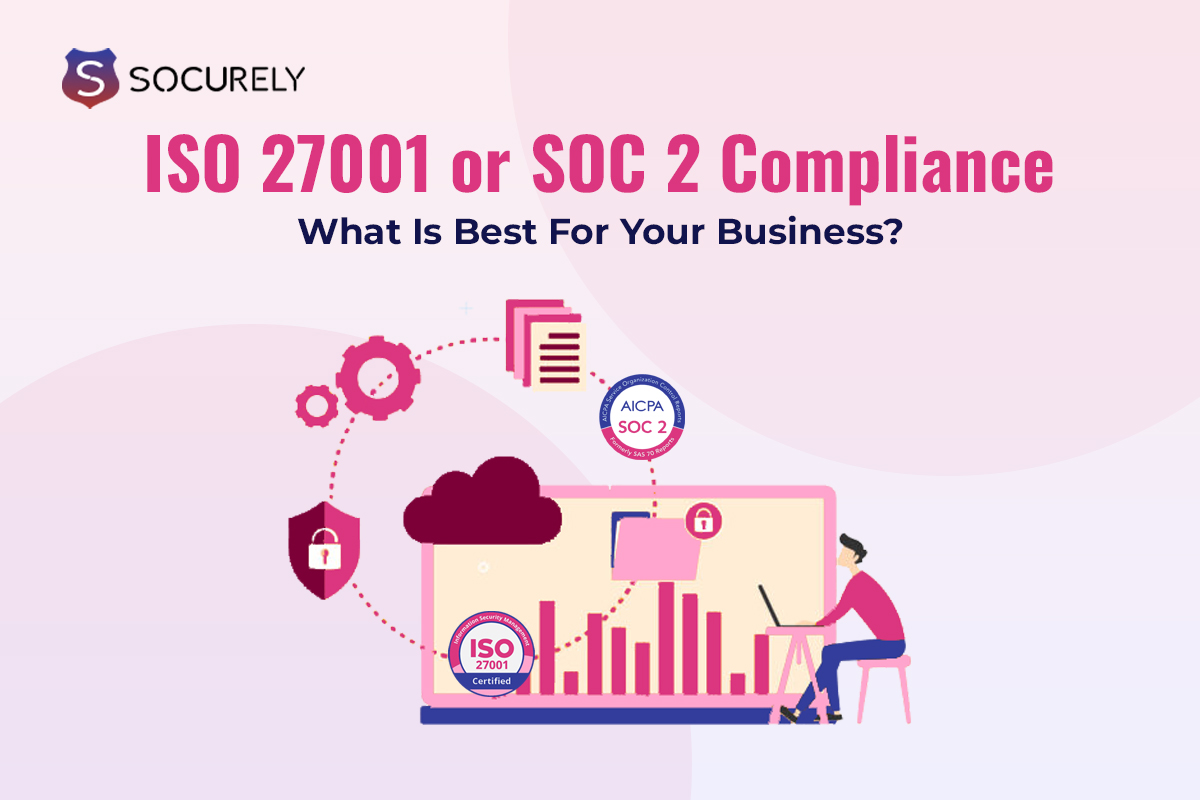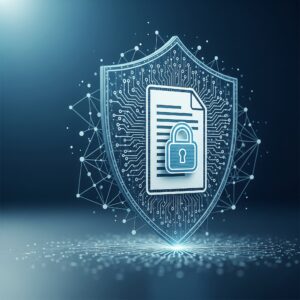Have you ever wondered which compliance framework—ISO 27001 or SOC 2—would best protect your business and instill confidence in your clients? As cyber threats continue to evolve, ensuring that your organization meets robust security standards has never been more critical. According to a 2023 survey by Cybersecurity Ventures, global spending on cybersecurity is expected to exceed $1 trillion by 2025, with a significant portion allocated to compliance with standards like ISO 27001 and SOC 2. These frameworks are crucial in safeguarding sensitive data, but deciding between them can be challenging.
In this blog, we will delve into the differences between ISO 27001 Compliance and SOC 2 Compliance, guiding you through the factors that determine which framework best fits your business needs. We will also explore the benefits and tradeoffs of each, helping you make an informed decision to secure your organization’s future.
Understanding ISO 27001 Compliance
Originally developed in the 1980s, ISO 27001 is an international standard for information security management systems (ISMS). It provides a comprehensive framework for managing sensitive company information systematically and securely, covering people, processes, and technology. The standard requires organizations to assess risks, implement controls, and continually improve their information security processes.
Key Features of ISO 27001:
- Risk Management: ISO 27001 is heavily focused on risk management. It requires businesses to identify potential security risks, assess their impact, and implement appropriate controls to mitigate them.
- Continuous Improvement: The standard promotes a culture of continuous improvement, ensuring that the ISMS evolves with changing security landscapes.
- International Recognition: ISO 27001 is globally recognized, making it an ideal choice for businesses operating in multiple countries.
Tradeoffs: While ISO 27001 Compliance provides a robust framework for managing information security, it requires a significant investment in terms of time and resources. The process of implementing and maintaining an ISMS can be complex, particularly for smaller organizations.
**Also read how to get IS0 27001 Compliance Certification.
Understanding SOC 2 Compliance
SOC 2 (System and Organization Controls 2) is a framework specifically designed for service providers storing customer data in the cloud. It ensures that organizations have the necessary controls in place to protect the privacy and security of this data. Unlike ISO 27001, which applies to all types of businesses, SOC 2 Compliance is particularly relevant for technology and cloud-based service providers.
Key Features of SOC 2:
- Focus on Data Security: SOC 2 is specifically tailored to protect customer data, making it a preferred choice for cloud service providers.
- Five Trust Service Criteria: SOC 2 is built around five key trust service criteria—security, availability, processing integrity, confidentiality, and privacy.
- Customizable Controls: The framework allows organizations to choose controls that best fit their specific needs, providing flexibility.
Tradeoffs: While SOC 2 Compliance is highly effective for cloud-based service providers, it may not be as comprehensive as ISO 27001 for organizations requiring a broader information security framework. Additionally, SOC 2 Audits can be time-consuming and require ongoing commitment.
**Also read how to get SOC 2 Compliance for your business!
ISO 27001 & SOC 2- Major Compliance Differences-
When deciding between ISO 27001 Compliance and SOC 2 Compliance for your business, understanding the core differences between these frameworks is essential. Here, we’ll explore several key aspects, including scope and applicability, global versus industry-specific recognition, the audit process, flexibility of controls, continuous improvement, target market, and attestation and reporting.
- Scope and Applicability:
- ISO 27001: This standard is versatile and applicable to any organization, regardless of size or industry. It provides a comprehensive framework for managing information security and can be adapted to various sectors, from finance to healthcare to government. ISO 27001 Compliance is ideal for businesses that need a broad, all-encompassing approach to information security management.
- SOC 2: In contrast, SOC 2 Compliance is primarily designed for service organizations, particularly those that store or process customer data in the cloud. It is highly relevant for technology companies, including SaaS providers, data centers, and cloud service providers. SOC 2 focuses on protecting data through specific trust service criteria, making it more tailored for the tech industry.
- Global vs. Industry-Specific Recognition:
- ISO 27001: Recognised globally, ISO 27001 is the preferred choice for organizations operating across multiple countries or regions. Its international acceptance helps businesses demonstrate their commitment to information security on a global scale, which can be a significant advantage in competitive markets.
- SOC 2: While SOC 2 is widely respected within certain industries, particularly in the United States, its recognition is more industry-specific. SOC 2 Compliance is often required or highly valued by clients within the tech sector, especially those looking for assurances that their data is being securely managed by service providers.
- Audit Process:
- ISO 27001: The ISO 27001 audit process is rigorous and involves a certification audit conducted by an accredited certification body. The certification is typically valid for three years, with mandatory annual surveillance audits to ensure ongoing compliance. This process provides a formal certification that is recognized worldwide.
- SOC 2: SOC 2 Audits are conducted by certified public accountants (CPAs) and can be performed as either Type 1 or Type 2 audits. A Type 1 audit assesses the design of controls at a specific point in time, while a Type 2 audit evaluates the effectiveness of those controls over some time, usually six months to a year. SOC 2 does not result in a formal certification but instead provides a detailed audit report.
- Flexibility of Controls:
- ISO 27001: The standard offers a comprehensive list of controls (Annex A), covering various aspects of information security. However, organizations have the flexibility to tailor these controls to their specific needs. If certain controls are deemed unnecessary, businesses must justify their exclusion. This flexibility allows for a customized approach while ensuring that all critical areas of security are addressed.
- SOC 2: One of the key advantages of SOC 2 is its flexibility in choosing controls. Organizations can select the trust service criteria that are most relevant to their operations—security, availability, processing integrity, confidentiality, and privacy. This allows businesses to focus on the aspects of security that matter most to their clients and industry, making it highly adaptable.
- Target Market:
- ISO 27001: The target market for ISO 27001 Compliance is broad, including organizations of all sizes and industries that need to demonstrate a comprehensive approach to information security management. It is particularly suited for businesses with a global footprint or those dealing with highly sensitive information, such as financial institutions, healthcare providers, and government agencies.
- SOC 2: The target market for SOC 2 Compliance is more specific, focusing primarily on service organizations, especially in the technology sector. This includes cloud service providers, SaaS companies, data centers, and other tech-driven businesses that handle client data. SOC 2 is often a requirement for companies that want to provide services to larger enterprises, particularly in industries where data security is a top priority.
- Attestation and Reporting:
- ISO 27001: Upon successful completion of an ISO 27001 audit, organizations receive a formal certification from an accredited body. This certification is widely recognized and can be used as evidence of the organization’s commitment to information security. The certification must be renewed every three years, with annual surveillance audits to ensure ongoing compliance.
- SOC 2: Rather than a certification, SOC 2 provides an attestation in the form of a detailed audit report. This report is usually shared with clients and stakeholders to demonstrate the organization’s compliance with the chosen trust service criteria. The SOC 2 Report can be a critical tool in building trust with customers, as it provides transparency about the organization’s security practices and the effectiveness of its controls.
Some Similarities Between ISO 27001 & SOC 2 Compliance
Despite their differences, ISO 27001 Compliance and SOC 2 Compliance share several similarities that make them both effective frameworks for ensuring information security:
- Risk-Based Approach: Both frameworks emphasize a risk-based approach to managing and securing information. Organizations are required to identify potential risks to their information assets and implement appropriate controls to mitigate these risks.
- Focus on Information Security: At their core, both ISO 27001 and SOC 2 are designed to protect the confidentiality, integrity, and availability of information. They both provide guidelines and controls to help organizations safeguard sensitive data from threats.
- Customizable Controls: While each framework provides a set of controls, both allow for customization to fit the specific needs and context of the organization. This flexibility enables businesses to tailor their information security practices to their unique environments.
- Third-Party Audits: Both ISO 27001 and SOC 2 involve independent third-party audits to verify that an organization’s controls are effectively implemented and maintained. This external validation is crucial for building trust with clients and stakeholders.
Making the Right Decision for Your Business
ISO 27001 Compliance is ideal for organizations that require a holistic approach to information security. It is particularly suited for businesses operating in multiple countries or those dealing with highly sensitive data. By implementing ISO 27001, companies can demonstrate their commitment to security, build trust with stakeholders, and improve their overall security posture.
Benefits of ISO 27001:
- Global Acceptance: Recognised worldwide, making it easier to do business internationally.
- Comprehensive Security Framework: Covers all aspects of information security, from physical to technical controls.
- Competitive Advantage: Enhances reputation and can be a differentiator in the marketplace.
SOC 2 Compliance is best suited for cloud-based service providers and technology companies that store or process customer data. It is an excellent choice for businesses looking to demonstrate their commitment to data security and privacy.
Benefits of SOC 2:
- Tailored for Technology Companies: Designed specifically for service providers handling customer data in the cloud.
- Flexibility: Allows organizations to customize controls based on their specific needs.
- Trust Service Criteria: Focuses on key aspects of data security, making it a reliable choice for companies in the tech industry.
Choosing between ISO 27001 and SOC 2 depends on your business needs, industry, and the specific risks you face. If your organization operates globally and requires a comprehensive security framework, ISO 27001 Compliance might be the better choice. However, if you are a technology company focused on protecting customer data in the cloud, SOC 2 Compliance could be more suitable.
How Socurely Can Help?
At Socurely, we understand that navigating the complexities of compliance can be daunting. Our team of experts is here to help you determine which framework—ISO 27001 or SOC 2—is right for your business. We offer tailored solutions to help you achieve compliance efficiently, whether through ISO 27001 certification or SOC 2 Audits. Our comprehensive services ensure that your organization remains secure and compliant, giving you peace of mind to focus on what matters most—growing your business.
Conclusion
Ensuring that your business meets the highest standards of information security is crucial. Whether you choose ISO 27001 Compliance or SOC 2 Compliance, the key is to select a framework that aligns with your business goals and industry requirements. By making an informed decision, you can safeguard your organization’s sensitive data, build trust with stakeholders, and maintain a competitive edge.







